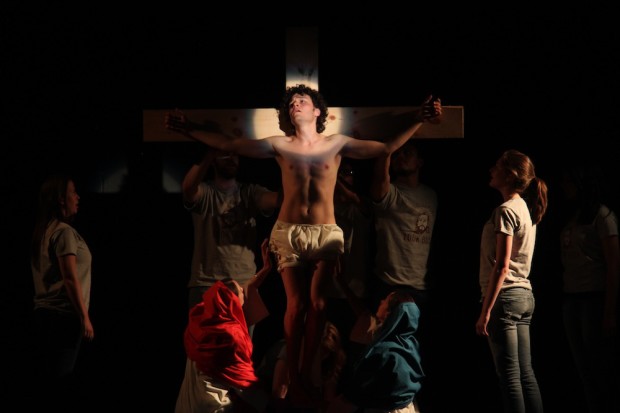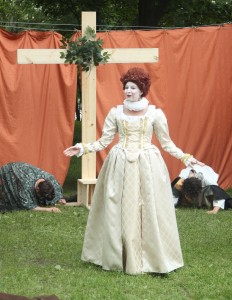What is passion?

Andrew Kushnir with Julie Tepperman, Mayko Nguyen and members of the Ensemble in Passion Play. Photo: Keith Barker
The Canadian premiere of Sarah Ruhl’s Passion Play begins tonight! Produced by a tryptic of indie theatre companies Outside the March, Convergence Theatre and Sheep No Wool, Passion Play explores the collision of religion, politics and theatre and the impact playing iconic biblical roles has on individuals and communities. Outside the March’s Katherine Cullen explores the meaning of the word ‘passion’.
The word Passion is an ambivalent word. It has a few somewhat contradictory meanings. According to ye olde, Online Etymological Dictionary Passion can mean the following:
Passionate (adj.): “early 15c., “angry; emotional,’ from Medieval Latin passionatus “affected with passion,” from Latin passio. Specific sense of “amorous” is attested from 1580’s. Replaced Old English polung, literally “suffering” from polian (v.) “to endure.” Sense of “sexual love” first attested 1580’s; that of “strong liking, enthusiasm, predilection” is from 1630’s.
Suffering, pain, emotional, desire, love. That’s a real cross to bear for one word. Its various meanings bring forth a varied pallet of human emotions that speak to a duality of experience. It is possible that the word Passion contains in it, then, a promise of what it means to be human: to live in a state of utter ambiguity and vulnerability.
In many ways, Sarah Ruhl’s Passion Play explores this social and historical drive of human beings to eradicate this ambiguity from our experience. One way to clean up the mess of human nature is to impose rules and order through various ideologies (organized religion, monarchy, political systems), icons (Jesus, Queen Elizabeth), and leaders and dictators (Hitler, Ronald Reagan). That way we don’t have to feel our passionate discomfort. To be told how to think and act can be easier than thinking for yourself.
To legitimate and sanctify only certain modes of being closes down the countless ways that we perform our humanness. There is a massive ethical price to be paid for the eradication of our inner diversity. Some of the characters in this play step outside the boundaries of arbitrary power and pay for it with their sanity or their lives.
For such an epic play, the show has a real humility to it. For one, it is very funny and never takes itself too seriously. There is a lot of room for humor when people are trying to fulfill roles they are not suited for. Maybe it is in these moments of laughter where ambiguity can live unencumbered by our desire to separate the black from the white.
On a personal note, this play reminds me of being a child. Child-logic is different from adult logic. I remember accepting all kinds of ridiculous notions to be true (i.e. imagining that if I held my breath I would become invisible and could eat as many cookies as I wanted with my mom in plain sight. Didn’t work out the way I planned). I miss that way of thinking, even if it didn’t get me the results I wanted.
In the world that Sarah Ruhl has imagined, there are “big beautiful fish puppets” that carry people off in “enormous boats.” It reminds me of lullabies and bedtime stories. It reminds me that dreamland can merge with reality, and magic feels strangely possible. Maybe this is the place where we are best equipped to handle ambiguity.
Passion Play runs June 6-30th. For tickets visit: outsidethemarch.ca




Recent Comments